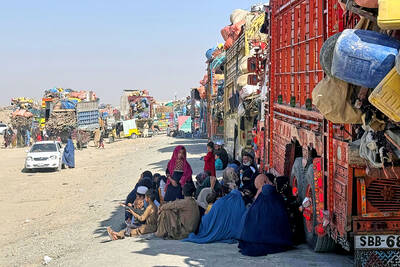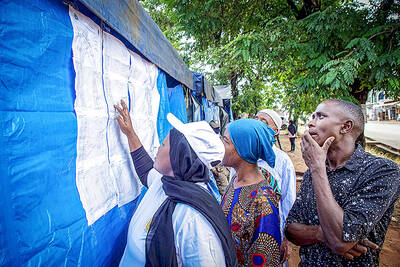Hong Kong hospitals yesterday started to turn away women from mainland China arriving to give birth in an attempt to stop a flood of cross-border “maternity tourists” costing the former British colony millions of US dollars.
The territory has imposed a three-month ban on childbirth bookings by mainland mothers, many of whom cross the border heavily pregnant to give birth in the wealthy city’s public hospitals.
Giving birth in Hong Kong not only guarantees them world-class health care but in many cases secures citizenship of the city of 6.9 million for children who would otherwise be entitled to only a Chinese passport.
LOTTERY
Hong Kong citizenship entitles them to free education, health care and other benefits throughout their life, the equivalent of winning the lottery for children from poor families in southern China.
The easing of cross-border restrictions in 2003 led to a flood of women crossing the border to give birth, sometimes arriving by the coach-load in “maternity tours” organized by enterprising middle-men.
More than 12,000 women from China gave birth in the territory in 2006, often leaving without paying nominal maternity charges, putting an enormous strain on the city’s public health services.
In February last year, Hong Kong’s Hospital Authority imposed charges of up to US$6,000 for each non-resident birth, which initially led to a fall of almost 40 percent in mainland Chinese women giving birth in the city.
But mainland women kept coming and in the first half of last year one fifth checked out without paying their bills while one third paid only a portion.
Altogether, the cost of mainland mothers who have given birth in Hong Kong hospitals and then left without paying all or some of their bills totals around US$6 million a year.
Now, bookings for non-resident women have been suspended from September to December to allow local women to be given priority at the peak period for births in Hong Kong.
Hospital Authority spokeswoman Beatrice Cheng (鄭信恩) said the ban might be extended to peak periods next year as the problem of overburdened maternity services remained acute.

With much pomp and circumstance, Cairo is today to inaugurate the long-awaited Grand Egyptian Museum (GEM), widely presented as the crowning jewel on authorities’ efforts to overhaul the country’s vital tourism industry. With a panoramic view of the Giza pyramids plateau, the museum houses thousands of artifacts spanning more than 5,000 years of Egyptian antiquity at a whopping cost of more than US$1 billion. More than two decades in the making, the ultra-modern museum anticipates 5 million visitors annually, with never-before-seen relics on display. In the run-up to the grand opening, Egyptian media and official statements have hailed the “historic moment,” describing the

‘CHILD PORNOGRAPHY’: The doll on Shein’s Web site measure about 80cm in height, and it was holding a teddy bear in a photo published by a daily newspaper France’s anti-fraud unit on Saturday said it had reported Asian e-commerce giant Shein (希音) for selling what it described as “sex dolls with a childlike appearance.” The French Directorate General for Competition, Consumer Affairs and Fraud Control (DGCCRF) said in a statement that the “description and categorization” of the items on Shein’s Web site “make it difficult to doubt the child pornography nature of the content.” Shortly after the statement, Shein announced that the dolls in question had been withdrawn from its platform and that it had launched an internal inquiry. On its Web site, Le Parisien daily published a

‘NO WORKABLE SOLUTION’: An official said Pakistan engaged in the spirit of peace, but Kabul continued its ‘unabated support to terrorists opposed to Pakistan’ Pakistan yesterday said that negotiations for a lasting truce with Afghanistan had “failed to bring about a workable solution,” warning that it would take steps to protect its people. Pakistan and Afghanistan have been holding negotiations in Istanbul, Turkey, aimed at securing peace after the South Asian neighbors’ deadliest border clashes in years. The violence, which killed more than 70 people and wounded hundreds, erupted following explosions in Kabul on Oct. 9 that the Taliban authorities blamed on Pakistan. “Regrettably, the Afghan side gave no assurances, kept deviating from the core issue and resorted to blame game, deflection and ruses,” Pakistani Minister of

UNCERTAIN TOLLS: Images on social media showed small protests that escalated, with reports of police shooting live rounds as polling stations were targeted Tanzania yesterday was on lockdown with a communications blackout, a day after elections turned into violent chaos with unconfirmed reports of many dead. Tanzanian President Samia Suluhu Hassan had sought to solidify her position and silence criticism within her party in the virtually uncontested polls, with the main challengers either jailed or disqualified. In the run-up, rights groups condemned a “wave of terror” in the east African nation, which has seen a string of high-profile abductions that ramped up in the final days. A heavy security presence on Wednesday failed to deter hundreds protesting in economic hub Dar es Salaam and elsewhere, some